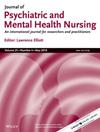I am the psychiatric patient and the psychiatric patient is me: Retelling a lived experience narrative of professional sexual misconduct
IF 2.6
4区 医学
Q1 NURSING
引用次数: 0
Abstract
What is known on the subject?
- Professional sexual misconduct is the name given to the phenomenon of healthcare providers crossing sexual boundaries with their patients. It is comprised of a range of behaviors from comments to unwanted touching and even rape. The exact incidence is unknown, but estimates have been made. These abuses are thought to be underreported. The applicable reporting processes are problematic.
- Trauma-informed care presupposes knowledge of various types of trauma, and this is one type. Traua-informed care places emphasis on healthcare systems and healthcare providers' avoidance of retraumatizing patients who disclose any type of trauma, including sexual violence.
What the paper adds to existing knowledge?
- This paper adds one narrative experience of a sexual assault perpetrated by the writer's colleague psychiatrist. It can be viewed as a cautionary tale about horizontal violence against nurses.
- This narrative discusses how one traumatic event can mushroom into chronic traumatic sequelae when disclosure re-traumatizes.
What are the implications for practice?
- Increased knowledge of this type of sexual violence may help those who have suffered it.
- As psychiatry is among the healthcare fields who regularly screen patients for trauma, it is imperative that the psychiatric workforce gain familiarity with trauma-informed responses to avoid re-traumatizing patients who disclose sexual violence.
我就是精神病人,精神病人就是我:重述职业性不端行为的真实经历。
关于该主题的已知信息:职业性行为不端是指医疗服务提供者与患者之间跨越性界限的现象。它包括从评论到不想要的触摸甚至强奸等一系列行为。确切的发生率尚不清楚,但已有估计。这些虐待行为被认为报告不足。适用的报告程序存在问题。创伤知情护理的前提是了解各种类型的创伤,这就是其中一种。创伤知情护理强调医疗保健系统和医疗保健提供者避免对披露任何类型创伤(包括性暴力)的患者造成再次创伤。本文对现有知识有何补充?本文补充了作者的精神科医生同事的一次性侵犯经历。它可以被看作是一个关于针对护士的横向暴力的警示故事。该叙述讨论了当披露再次造成创伤时,创伤事件如何会如雨后春笋般发展成慢性创伤后遗症。对实践的启示是什么?由于精神科是定期筛查患者创伤的医疗领域之一,因此精神科医务人员必须熟悉创伤知情反应,以避免披露性暴力的患者再次遭受创伤。
本文章由计算机程序翻译,如有差异,请以英文原文为准。
求助全文
约1分钟内获得全文
求助全文
来源期刊
CiteScore
4.70
自引率
3.70%
发文量
75
审稿时长
4-8 weeks
期刊介绍:
The Journal of Psychiatric and Mental Health Nursing is an international journal which publishes research and scholarly papers that advance the development of policy, practice, research and education in all aspects of mental health nursing. We publish rigorously conducted research, literature reviews, essays and debates, and consumer practitioner narratives; all of which add new knowledge and advance practice globally.
All papers must have clear implications for mental health nursing either solely or part of multidisciplinary practice. Papers are welcomed which draw on single or multiple research and academic disciplines. We give space to practitioner and consumer perspectives and ensure research published in the journal can be understood by a wide audience. We encourage critical debate and exchange of ideas and therefore welcome letters to the editor and essays and debates in mental health.

 求助内容:
求助内容: 应助结果提醒方式:
应助结果提醒方式:


